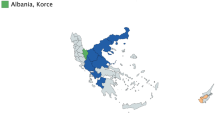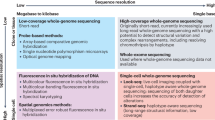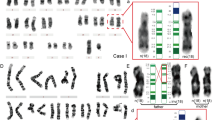Abstract
FUNCTIONALLY equivalent genetic material can be labelled by an epigenetic marking process and used differentially depending on whether its origin is maternal or paternal1. This phenomenon is known as genomic imprinting and is manifested at either the chromosomal or gene level. Genomic imprinting seems to play an important role in cancer predisposition syndromes2–5, and phenotypic consequences are evident in constitutional deletion syndromes and uniparental disomies1. Moreover, there seems to be a preferential retention of paternal alleles in sporadic tumours such as Wilms' tumour6, rhabdomyosarcoma7, osteosarcoma8 and retinoblastoma9. To investigate whether chromosomes involved in acquired abnormalities of haematologic neoplasms show a similar 'parent of origin' bias, we studied the inheritance of the translocated chromosomes 9 and 22 in cases of Philadelphia-chromosome-positive leukaemia, using unique specific chromosome band polymorphisms. Here we show that the translocated chromosome 9 was of paternal origin, whereas the translocated chromosomes 22 were derived exclusively from the maternal copy, in 11 cases with reliable polymorphisms. Our data therefore provide evidence that imprinting phenomena may play an important role in acquired tumour-specific chromosome rearrangements.
This is a preview of subscription content, access via your institution
Access options
Subscribe to this journal
Receive 51 print issues and online access
$199.00 per year
only $3.90 per issue
Buy this article
- Purchase on Springer Link
- Instant access to full article PDF
Prices may be subject to local taxes which are calculated during checkout
Similar content being viewed by others
References
Hall, J. G. Am. J. hum. Genet. 46, 857–873 (1990).
Ferguson-Smith, A. C., Reik, W. & Surani, A. M. Cancer Sun. 9, 487–503 (1990).
Reik, W. & Surani, M. A. Nature 338, 112–113 (1989).
Jadayel, D. et al. Nature 343, 558–559 (1990).
Henry, I. et al. Nature 351, 665–667 (1991).
Pal, N. et al. Oncogene 5, 1665–1668 (1990).
Scrable, H. et al. Proc. natn. Acad. Sci. U.S.A. 86, 7480–7484 (1989).
Toguchida, J. et al. Nature 338, 156–158 (1989).
Leach, R. J. et al. Cell Growth Differ. 1, 401–406 (1990).
Antonarakis, S. E. & the Down Syndrome Collaborative Group, N. Engl. J. Med. 324, 872–876 (1991).
Olson, S. B. & Magenis, R. E. in The Cytogenetics of Mammalian Autosomal Rearrangements (ed. Sandberg, A. A.) 583–599 (Liss, New York, 1988).
Hassold, T. J. & Jacobs, P. A. A. Rev. Genet. 18, 69–97 (1984).
Markovic, V. D., Worton, R. G. & Berg, J. M. Hum. Genet. 41, 181–187 (1978).
Müller, H. J., Klinger, H. P. & Glasser, M. Cytogenet. Cell Genet. 15, 239–255 (1975).
Verma, R. S. & Babu, A. Human Chromosomes. Manual of Basic Techniques (Pergamon, New York, 1989).
Jones, P. A. & Buckley, J. D. Adv. Cancer Res. 54, 1–23 (1990).
Reik, W., Collick, A., Norris, M. L., Barton, S. C. & Surani, M. A. Nature 328, 248–251 (1987).
Sapienza, C., Peterson, A. C., Rossant, J. & Balling, R. Nature 328, 251–254 (1987).
Doerfler, W. A. Rev. Biochem. 52, 93–124 (1983).
Smith, S. S. Molec. Carcinogen 4, 91–92 (1991).
Daley, G. Q. & Ben-Neriah, Y. Adv. Cancer Res. 57, 151–184 (1991).
Campbell, M. L. & Arlinghaus, R. B. Adv. Cancer Res. 57, 227–256 (1991).
Yamada, T. & Secker-Walker, L. M. Leukemia 4, 341–344 (1990).
Schaefer-Rego, K. E., Leibowitz, D. & Mears, J. G. Oncogene 5, 1669–1673 (1990).
Cedar, H. Cell 53, 3–4 (1988).
Coté, G. B. Anns Génét. 32, 69–72 (1989).
Surani, M. A., Reik, W. & Allen, N. D. Trends Genet. 4, 59–62 (1988).
Lettmann, C., Schmitz, B. & Doerfler, W. Nucleic Acids Res. 19, 7131–7137 (1991).
Sapienza, C. Biochim. biophys. Acta 1072, 51–61 (1991).
Panthier, J. J. & Condamine, H. BioEssays 13, 351–356 (1991).
Lion, T., Prischl, F., Haas, O. A., Pont, J. & Schwarzmeier, J. D. Leukemia 5, 156–159 (1991).
Schweizer, D. Cytogenet. Cell Genet. 27, 190–193 (1980).
Howell, W. M. & Black, D. A. Experientia 36, 1014 (1980).
Author information
Authors and Affiliations
Rights and permissions
About this article
Cite this article
Haas, O., Argyriou-Tirita, A. & Lion, T. Parental origin of chromosomes involved in the translocation t(9;22). Nature 359, 414–416 (1992). https://doi.org/10.1038/359414a0
Received:
Accepted:
Issue Date:
DOI: https://doi.org/10.1038/359414a0
This article is cited by
-
Blockade of the Tumor Necrosis Factor-Related Apoptosis Inducing Ligand Death Receptor DR5 Prevents β-Amyloid Neurotoxicity
Neuropsychopharmacology (2007)
-
The paternal chromosome 9 and the maternal chromosome 22 are preferentially rearranged in chronic myeloid leukaemia
Leukemia (2004)
-
Excess of deletions of maternal origin in the DiGeorge/Velo-cardio-facial syndromes. A study of 22 new patients and review of the literature
Human Genetics (1995)
-
Lack of imprinting of the ABL gene
Nature Genetics (1994)
-
Lack of imprinting of BCR
Nature Genetics (1994)
Comments
By submitting a comment you agree to abide by our Terms and Community Guidelines. If you find something abusive or that does not comply with our terms or guidelines please flag it as inappropriate.



